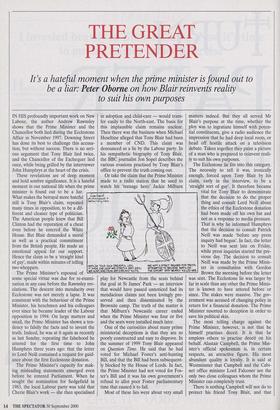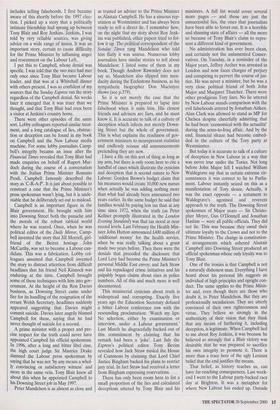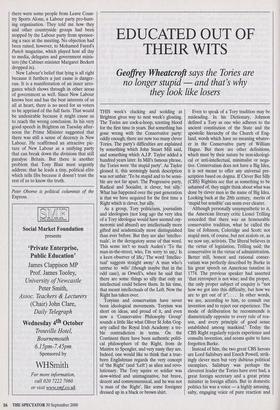THE GREAT PRETENDER
It's a hateful moment when the prime minister is found out to
be a liar: Peter Oborne on how Blair reinvents reality
to suit his own purposes
IN HIS profoundly important work on New Labour, the author Andrew Rawnsley shows that the Prime Minister and the Chancellor both lied during the Ecclestone Affair in November 1997. Downing Street has done its best to challenge this accusa- tion, but without success. There is no seri- ous argument that Tony Blair lied twice, and the Chancellor of the Exchequer lied once, while being grilled by the interviewer John Humphrys at the heart of the crisis.
These revelations are of deep moment and hold sombre significance. It is a hateful moment in our national life when the prime minister is found out to be a liar. What makes the betrayal more hateful still is Tony Blair's claim, repeated many times in opposition, to be a dif- ferent and cleaner type of politician. The American people knew that Bill Clinton had the reputation of a cheat even before he entered the White House. But Blair demanded a moral as well as a practical commitment from the British people. He made an emotional appeal for our support. Hence the claim to be a 'straight kind of guy', made within minutes of telling two whoppers.
The Prime Minister's espousal of some special virtue was due for re-exami- nation in any case before the Rawnsley rev- elations. The descent into mendacity over Ecclestone was not merely a lapse. It was consistent with the behaviour of the Prime Minister, his henchmen and his colleagues ever since he became leader of the Labour opposition in 1994. On large matters and small, the Prime Minister has shown a ten- dency to falsify the facts and to invent the truth. Indeed, he was at it again as recently as last Sunday, repeating the falsehood he uttered for the first time to John Humphrys three years ago: that the letter to Lord Neill contained a request for guid- ance about the first Ecclestone donation.
The Prime Minister's capacity for mak- ing misleading statements emerged even before he entered Parliament. When he sought the nomination for Sedgefield in 1983, the local Labour party was told that Cherie Blair's work — she then specialised in adoption and child-care — would trans- fer easily to the North-east. The basis for this implausible claim remains unclear. Then there was the business when Michael Heseltine alleged that Tony Blair had been a member of CND. This claim was denounced as a lie by the Labour party. In his sympathetic biography of Tony Blair, the BBC journalist Jon Sopel describes the various evasions practised by Tony Blair's office to prevent the truth coming out.
Or take the claim that the Prime Minister made to a radio station that he used to watch his 'teenage hero' Jackie Milburn play for Newcastle from the seats behind the goal at St James' Park — an interview that would have passed unnoticed had its mendacious claims not been lovingly pre- served and then disseminated by the Brownite camp. The truth of the matter is that Milburn's Newcastle career ended when the Prime Minister was four or five and the seats were installed much later.
One of the curiosities about many prime ministerial deceptions is that they are so poorly constructed and easy to disprove. In the summer of 1999 Tony Blair appeared on Question Time. He said that he had voted for Michael Foster's anti-hunting Bill, and that the Bill had been subsequent- ly blocked by the House of Lords. In fact, the Prime Minister had not voted for Fos- ter's Bill and it was his own government's refusal to allot poor Foster parliamentary time that caused it to fail.
Most of these lies were about very small matters indeed. But they all served Mr Blair's purpose at the time, whether the ploy was to ingratiate himself with poten- tial constituents, give a radio audience the impression that he had deep local roots, or head off hostile attack on a television debate. Taken together they paint a picture of a man who is prepared to reinvent reali- ty to suit his own purposes, The most telling charge against the Prime Minister, however, is not that he himself practises deceit. It is that he employs others to practise deceit on his behalf. Alastair Campbell, the Prime Min- ister's official spokesman is, in certain respects, an attractive figure. His most abundant quality is loyalty. It is said at Westminster that Campbell and the Cabi- net office minister Lord Falconer are the only two close colleagues whom the Prime Minister can completely trust.
There is nothing Campbell will not do to protect his friend Tony Blair, and that includes telling falsehoods. I first became aware of this shortly before the 1997 elec- tion. I picked up a story that a politically intimate friendship had sprung up between Tony Blair and Roy Jenkins. Jenkins, I was told by very reliable sources, was giving advice on a wide range of issues. It was an important story, certain to cause difficulty for the Prime Minister by inflaming anger and resentment on the Labour Left.
I put this to Campbell, whose denial was specific. I was told that the two men had met only once since Tony Blair became Labour leader, and that was at a Whitehall dinner with others present. I was so confident of my sources that the Sunday Express ran the story regardless of the Campbell denial. Six weeks later it emerged that it was truer than we thought, and that Tony Blair had even been a visitor at Jenkins's country home.
There were other episodes of the same sort. Lobby colleagues reported similar treat- ment, and a long catalogue of lies, obstruc- tion or deception can be found in my book on Campbell and the New Labour media machine, For some lobby journalists Camp- bell's integrity became an issue after the Financial Times revealed that Tony Blair had made enquiries on behalf of Rupert Mur- doch during the course of a conversation with the Italian Prime Minister Romano Prodi. Campbell famously described the story as `C-R-A-P. It is just about possible to construct a case that the Prime Minister's press spokesman wasn't lying, but it is unde- niable that he deliberately set out to mislead.
Campbell is an important figure in the Blair government. He brought with him into Downing Street both the panache and the morals of the robust tabloid world where he was reared, Once, when he was political editor of the Daily Mirror, Camp- bell invented the story that Jill Morrell, girl- friend of the Beirut hostage John McCarthy, was set to become a Labour can- didate. This was a fabrication. Lobby col- leagues assumed that Campbell invented the story to distract attention from difficult headlines that his friend Neil Kinnock was enduring at the time. Campbell brought some of these techniques with him into gov- ernment. At the height of the Ron Davies business, as Downing Street came under fire for its handling of the resignation of the errant Welsh Secretary, headlines suddenly appeared suggesting that Davies might commit suicide. Davies later angrily blamed Campbell for these, saying that he had never thought of suicide for a second.
A prime minister with a proper and pre- cise respect for the truth could never have appointed Campbell his official spokesman. In 1996, after a long and bitter libel case, the high court judge Sir Maurice Drake damned the Labour press spokesman by saying that he was not 'by any means a whol- ly convincing or satisfactory witness' and more in the same vein. Tony Blair knew all about this when he appointed Campbell to his Downing Street job in May 1997.
Peter Mandelson is as almost as close and as trusted an adviser to the Prime Minister as Alastair Campbell. He has a sinuous rep- utation at Westminster and has always been ready to tell a direct lie. I remember how, on the night that my story about Roy Jenk- ins was published, other papers tried to fol- low it up. The political correspondent of the Sunday Times rang Mandelson who told him flatly it was untrue. Numerous lobby journalists have similar stories to tell about Mandelson: I listed some of them in my book. Though Andrew Rawnsley does not say so, Mandelson also slipped into men- dacity during the Ecclestone business, as his sympathetic biographer Don Macintyre shows (see p.379).
So it is not merely the case that the Prime Minister is prepared to lapse into falsehood when it suits him. His closest friends and advisers are liars, and he must know it. It is accurate to talk of a culture of deception which infects not merely Down- ing Street but the whole of government. This is what explains the readiness of gov- ernment ministers to misrepresent statistics and endlessly reissue old announcements pretending they are new.
I have a file on this sort of thing as long as my arm, but there is only room here to cite a handful of cases which illustrate the cynicism and deception that is second nature to New Labour: Gordon Brown's budget claim that his measures would create 10,000 new nurses when actually he was adding nothing more than what had already been announced two years earlier. In the same budget he said that families would be paying less tax than at any time since 1972, when the truth (as Peter Kellner promptly illustrated in the London Evening Standard) was that tax stood at near record levels. Last February the Health Min- ister John Hutton announced £400 million of `additional money' for the health service, when he was really talking about a grant made two years before. Then there were the denials that preceded the disclosure that Lord Levy had become the Prime Minister's personal Middle East envoy; and Jack Straw and his repackaged crime initiatives and his palpably bogus claims about rises in police numbers. All of this and much more is well documented.
This ministerial cynicism about truth is widespread and corrupting. Exactly five years ago the Education Secretary defused a bitter Labour conference row with the resounding proclamation: 'Watch my lips: No selection, either by examination or interview, under a Labour government.' Last March he disgracefully backed out of this commitment by claiming that his remark had been a 'joke'. Last July the Express's political editor Tony Bevins revealed how Jack Straw misled the House of Commons by claiming that Lord Chief Justice Bingham backed his plans to restrict jury trial. In fact Straw had received a letter from Bingham expressing reservations.
There has only been room here to list a small proportion of the lies and calculated deceptions uttered by Tony Blair and his ministers. A full list would cover several more pages — and those are just the unsuccessful lies, the ones that journalists have been able to ferret out. It is a horrible and shaming state of affairs — all the more so because of Tony Blair's claim to repre- sent a different kind of government.
No administration has ever been clean, and certainly not the unlamented Conser- vatives. On Tuesday, in a reminder of the Major years, Jeffrey Archer was arrested in London and now faces charges of perjury and conspiring to pervert the course of jus- tice. He was never a minister, but he was a very close political friend of both John Major and Margaret Thatcher. There were other prodigious Tory liars. No lie uttered by New Labour stands comparison with the evil falsehoods uttered by Jonathan Aitken. Alan Clark was allowed to stand as MP for Chelsea despite cheerfully admitting that he had been 'economical with the actualite during the arms-to-Iraq affair. And by the end, financial sleaze had become embed- ded in the culture of the Tory party at Westminster.
But today it is accurate to talk of a culture of deception in New Labour in a way that was never true under the Tories. Not long before John Major fell I watched William Waldegrave say that in certain extreme cir- cumstances it was correct to lie to Parlia- ment. Labour instantly seized on this as a manifestation of Tory sleaze. Actually, it was the exact opposite — a testament to Waldegrave's agonised and reverent approach to the truth. The Downing Street spokesmen of Major years — Sir Christo- pher Meyer, Gus O'Donnell and Jonathan Haslam — were all public officials. They did not lie. This was because they owed their ultimate loyalty to the Crown and not to the Prime Minister. The change in constitution- al arrangements which ushered Alastair Campbell into Downing Street produced an official spokesman whose only loyalty was to Tony Blair.
One of the ironies is that Campbell is not a naturally dishonest man. Everything I have heard about his personal life suggests an individual of high principles and upright con- duct. The same applies to the Prime Minis- ter and, even though there are those who doubt it, to Peter Mandelson. But they are professionally mendacious. They are utterly convinced of their own righteousness and virtue. They believe so strongly in the authenticity of their vision that they think that any means of furthering it, including deception, is legitimate. When Campbell lied to me about Roy Jenkins, it was because he believed so strongly that a Blair victory was desirable that he was prepared to sacrifice his own integrity to promote it. There is more than a trace here of the ugly Leninist belief that the end justifies the means.
That belief, as history teaches us, can have far-reaching consequences. Last week- end I went to the Labour party-backed race day at Brighton. It was a metaphor for where New Labour has ended up. Outside there were some people from Leave Coun- try Sports Alone, a Labour party pro-hunt- ing organisation. They told me how they and other countryside groups had been stopped by the Labour party from sponsor- ing a race at the meeting. No objection had been raised, however, to Mohamed Fayed's Punch magazine, which played host all day to media, delegates and government minis- ters (the Cabinet minister Margaret Beckett dropped in).
New Labour's belief that lying is all right because it furthers a just cause is danger- ous. It is a manifestation of an inner arro- gance which shows through in other areas of government as well. Since New Labour knows best and has the best interests of us all at heart, there is no need for us voters to be apprised of the full facts. That would be undesirable because it might cause us to reach the wrong conclusion. In his very good speech in Brighton on Tuesday after- noon the Prime Minister suggested that there was still a sense of decency in New Labour. He reaffirmed an attractive pic- ture of New Labour as a unifying party that can break down the divisions that still paralyse Britain. But there is another problem that Tony Blair must urgently address: that he leads a tiny, political elite which tells fibs because it doesn't trust the rest of us to know the truth.
Peter Oborne is political columnist of the Express.




























































































 Previous page
Previous page